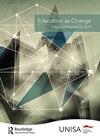通过诗歌去殖民化:建立第一民族的声音和促进讲真话
IF 1
4区 教育学
Q3 EDUCATION & EDUCATIONAL RESEARCH
引用次数: 7
摘要
在南非和澳大利亚等南部地区,高中和大学非殖民化的势头越来越大。在这篇文章中,我们使用了一种多元的方法,将不同的创作和学术声音并置,认为诗歌为高中和大学课程的非殖民化提供了一系列生成的可能性。自英国定居/入侵以来,澳大利亚原住民的诗歌一直站在争取土地权利、承认、正义和条约的土著政治抗议运动的前沿。诗歌为原住民和托雷斯海峡岛民提供了一个强大的工具,让他们可以对殖民权力进行反击。在这篇文章中,一个由土著和非土著研究人员组成的团队认为,诗歌可以成为土著声音和知识的强大载体。我们认为,诗歌可以为深入倾听创造空间(dadirri),用心倾听可以促进讲真话,并在原住民和白人定居者社区之间建立联系。这些非殖民化努力支撑了我们在本文中讨论的“Wandiny(聚会)——用心倾听:通过诗歌团结国家”研究。我们通过将我们的合著者、北领地昆加拉坎人的原住民长老苏·斯坦顿阿姨的诗歌与她的一些合著者的诗歌回应结合起来,来模拟我们的呼吁和回应方法。本文章由计算机程序翻译,如有差异,请以英文原文为准。
Decolonisation through Poetry: Building First Nations’ Voice and Promoting Truth-Telling
The impetus to decolonise high schools and universities has been gaining momentum in Southern locations such as South Africa and Australia. In this article, we use a polyvocal approach, juxtaposing different creative and scholarly voices, to argue that poetry offers a range of generative possibilities for the decolonisation of high school and university curricula. Australian First Nations’ poetry has been at the forefront of the Indigenous political protest movement for land rights, recognition, justice and Treaty since the British settlement/invasion. Poetry has provided Aboriginal and Torres Strait Islander peoples with a powerful vehicle for speaking back to colonial power. In this article, a team of Indigenous and non-Indigenous researchers argue that poetry can be a powerful vehicle for Indigenous voices and Knowledges. We suggest that poetry can create spaces for deep listening (dadirri), and that listening with the heart can promote truth-telling and build connections between First Nations and white settler communities. These decolonising efforts underpin the “Wandiny (gathering together)—Listen with the Heart: Uniting Nations through Poetry” research that we discuss in this article. We model our call-and-response methodology by including the poetry of our co-author and Aboriginal Elder of the Kungarakan people in the Northern Territory, Aunty Sue Stanton, with poetic responses by some of her co-authors.
求助全文
通过发布文献求助,成功后即可免费获取论文全文。
去求助
来源期刊

Education As Change
EDUCATION & EDUCATIONAL RESEARCH-
CiteScore
1.40
自引率
0.00%
发文量
29
审稿时长
24 weeks
期刊介绍:
Education as Change is an accredited, peer reviewed scholarly online journal that publishes original articles reflecting critically on issues of equality in education and on the ways in which educational practices contribute to transformation in non-formal, formal and informal contexts. Critique, mainly understood in the tradition of critical pedagogies, is a constructive process which contributes towards a better world. Contributions from and about marginalised communities and from different knowledge traditions are encouraged. The articles could draw on any rigorous research methodology, as well as transdisciplinary approaches. Research of a very specialised or technical nature should be framed within relevant discourses. While specialised kinds of research are encouraged, authors are expected to write for a broader audience of educational researchers and practitioners without losing conceptual and theoretical depth and rigour. All sectors of education are covered in the journal. These include primary, secondary and tertiary education, adult education, worker education, educational policy and teacher education.
 求助内容:
求助内容: 应助结果提醒方式:
应助结果提醒方式:


